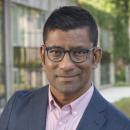Law Review Convenes Top Scholars for Chicago-Focused Symposium on Urban Violence

The University of Chicago Law Review will convene some of the nation’s leading scholars on May 7 for a virtual symposium aimed at examining the causes of urban violence. The event will showcase a diverse range of empirical, theoretical, and legal perspectives and confront questions related to concentrated poverty, policing and incarceration, community initiatives, and more. Many of the papers focus on policing and violence in Chicago.
“Violence of different sorts remains a most pressing cause of inequality and suffering in large cities,” said Aziz Huq, the Frank and Bernice J. Greenberg Professor of Law, who is the faculty co-advisor with Professor John Rappaport. “While the law strives to address different sorts of violence, we still have a great deal to learn from the social sciences about how and why it happens. This conference aims to bridge that gap.”
The Law Review, an 88-year-old student-led journal, originally planned to hold the event, “This Violent City? Rhetoric, Realities, and the Perils and Promise of Reform,” in the spring of 2020. The symposium was postponed because of the pandemic and will be held via Zoom.
“While it’s disappointing that the pandemic derailed our original plans, the police and private violence we’ve witnessed over the past year, as well as the pandemic’s acute effects on urban communities of color, have only heightened the importance of a frank and thoughtful discussion about the causes of and appropriate responses to violence in our cities,” Rappaport said.
The symposium will feature papers examining a variety of topics, including the Chicago Police Department’s use of data in response to the three largest homicide waves since 1965; state preemption laws, which fully or partially limit cities’ ability to regulate guns at the local level; and the role of the Supreme Court’s 2000 decision in Illinois v. Wardlow in facilitating policing practices that marginalize and control Black people in the everyday spaces of racially segregated Black neighborhoods. Huq will present a paper, “Evaluating Policing’s Contributions to Urban Violence,” that describes a range of empirical approaches that can be used to evaluate the positive and negative impacts of specific policing tactics on criminal violence.
Moderators will include Huq, Rappaport, and Richard McAdams, the Bernard D. Meltzer Professor of Law.
Brenna Darling, ’21, the Volume 88 symposium and reviews editor, was part of planning the original 2020 conference.
“The continued engagement of our symposium participants throughout the year-long delay speaks to the importance of this topic,” she said. “National conversations around rethinking the role of police and using more creative strategies to address violence have made these issues even more salient.”

